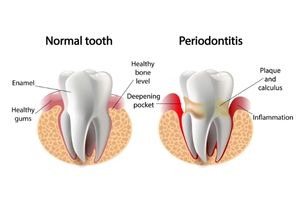Location
Bldg 1050 Suite B
Wichita, Kansas 67205
Hours
8am – 5pm



Gum disease, also called periodontal disease, occurs when bacteria that is not cleaned off the teeth starts to affect the gums. This can lead to a variety of oral health issues and even other medical issues including heart disease.
Gum disease starts out as gingivitis. Inflamed and red gums, or gums that bleed when you brush, or floss are signs of gingivitis. This can be reversed with proper oral hygiene including brushing your teeth twice a day, flossing regularly, and having your teeth cleaned twice a year by the dentist.
Once gingivitis progresses it turns into periodontal disease, which is a more serious form of gum disease. Periodontal disease will not only cause your gums to recede and your teeth to fall out, but it can also cause damage to your jawbone. When gum disease attacks, it can cause pockets to form around teeth which can lead to tooth loss and eventually deterioration of the jawbone.
Some signs of gum disease can include loose teeth, bad breath, sensitive teeth, and receding gums. You may also have trouble eating or notice a change in your bite. You may also notice your gums bleeding after flossing or brushing.
It’s important to know the factors that make you at higher risk for periodontal disease to reduce as many of them as possible.
Smoking interferes with the normal function of your gum tissue cells. This can lead to a reduction of attachment of bone and soft tissue to your teeth. Smoking also reduces the blood flow to your gums which can delay wound healing.
Diabetes is another risk factor. Elevated blood sugar will cause more bacteria in the mouth which can lead to periodontal disease. In addition, reduced blood flow from diabetes can weaken the bones and gums.
Osteoporosis and periodontal disease are both destructive to bones. Those with osteoporosis are at a greater risk for gum disease.
Poor oral hygiene can play a part in periodontal disease. Be sure you are brushing your teeth twice a day and flossing at least once a day. Use mouthwash to help destroy bacteria and add an extra layer of protection.
Age and genetics are two risk factors that can’t be avoided. However, reducing your other risk factors will help you keep your gums healthier overall.
Early intervention in gum disease is critical. If you are showing signs of periodontal disease, schedule an appointment at Reflection Ridge Dental right away. Our dental team can examine your gums and offer treatment options if necessary.